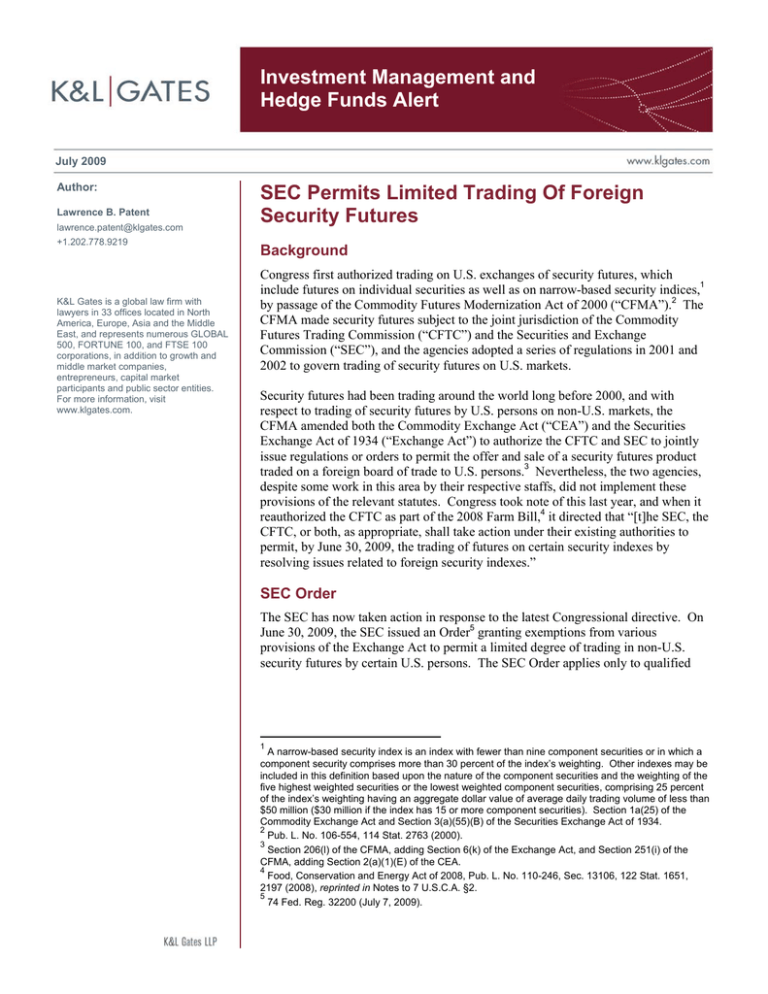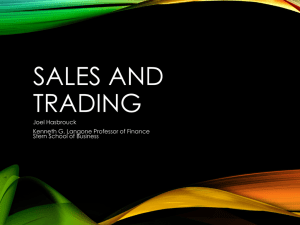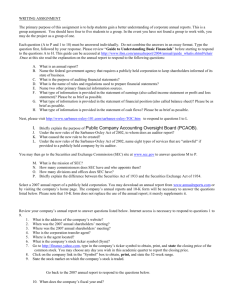
Investment Management and
Hedge Funds Alert
July 2009
Author:
Lawrence B. Patent
lawrence.patent@klgates.com
+1.202.778.9219
K&L Gates is a global law firm with
lawyers in 33 offices located in North
America, Europe, Asia and the Middle
East, and represents numerous GLOBAL
500, FORTUNE 100, and FTSE 100
corporations, in addition to growth and
middle market companies,
entrepreneurs, capital market
participants and public sector entities.
For more information, visit
www.klgates.com.
SEC Permits Limited Trading Of Foreign
Security Futures
Background
Congress first authorized trading on U.S. exchanges of security futures, which
include futures on individual securities as well as on narrow-based security indices,1
by passage of the Commodity Futures Modernization Act of 2000 (“CFMA”).2 The
CFMA made security futures subject to the joint jurisdiction of the Commodity
Futures Trading Commission (“CFTC”) and the Securities and Exchange
Commission (“SEC”), and the agencies adopted a series of regulations in 2001 and
2002 to govern trading of security futures on U.S. markets.
Security futures had been trading around the world long before 2000, and with
respect to trading of security futures by U.S. persons on non-U.S. markets, the
CFMA amended both the Commodity Exchange Act (“CEA”) and the Securities
Exchange Act of 1934 (“Exchange Act”) to authorize the CFTC and SEC to jointly
issue regulations or orders to permit the offer and sale of a security futures product
traded on a foreign board of trade to U.S. persons.3 Nevertheless, the two agencies,
despite some work in this area by their respective staffs, did not implement these
provisions of the relevant statutes. Congress took note of this last year, and when it
reauthorized the CFTC as part of the 2008 Farm Bill,4 it directed that “[t]he SEC, the
CFTC, or both, as appropriate, shall take action under their existing authorities to
permit, by June 30, 2009, the trading of futures on certain security indexes by
resolving issues related to foreign security indexes.”
SEC Order
The SEC has now taken action in response to the latest Congressional directive. On
June 30, 2009, the SEC issued an Order5 granting exemptions from various
provisions of the Exchange Act to permit a limited degree of trading in non-U.S.
security futures by certain U.S. persons. The SEC Order applies only to qualified
1
A narrow-based security index is an index with fewer than nine component securities or in which a
component security comprises more than 30 percent of the index’s weighting. Other indexes may be
included in this definition based upon the nature of the component securities and the weighting of the
five highest weighted securities or the lowest weighted component securities, comprising 25 percent
of the index’s weighting having an aggregate dollar value of average daily trading volume of less than
$50 million ($30 million if the index has 15 or more component securities). Section 1a(25) of the
Commodity Exchange Act and Section 3(a)(55)(B) of the Securities Exchange Act of 1934.
2
Pub. L. No. 106-554, 114 Stat. 2763 (2000).
3
Section 206(l) of the CFMA, adding Section 6(k) of the Exchange Act, and Section 251(i) of the
CFMA, adding Section 2(a)(1)(E) of the CEA.
4
Food, Conservation and Energy Act of 2008, Pub. L. No. 110-246, Sec. 13106, 122 Stat. 1651,
2197 (2008), reprinted in Notes to 7 U.S.C.A. §2.
5
74 Fed. Reg. 32200 (July 7, 2009).
Investment Management and Hedge Funds Alert
institutional buyers (“QIBs”)6 and non-U.S.
persons,7 and to registered securities brokers or
dealers8 or banks9 that effect transactions on behalf
of QIBs and non-U.S. persons.10 The products
permitted to be traded in accordance with the SEC
Order include futures contracts on individual equity
or debt securities, as well as narrow-based security
indices. If the underlying instrument is an individual
equity security, it must be:
a security issued by a foreign private issuer (as
defined in Rule 3b-4(c) of the [Exchange Act]
and Rule 405 under the [Securities Act] for
which at least 55 percent of the worldwide
trading volume in the security took place in, on,
or through the facilities of a securities market or
markets in a single foreign jurisdiction or in no
more than two foreign jurisdictions during the
issuer’s most recently completed fiscal year. If
the trading in the foreign private issuer’s
security is in two foreign jurisdictions, the
trading for the issuer’s securities in at least one
of the two foreign jurisdictions must be greater
than the trading in the U.S. for the same class of
the issuer’s securities in order for such
6
A QIB is defined in Rule 144A under the Securities Act of
1933 (“Securities Act”), 17 C.F.R. §230.144A, and generally
requires that the institution, acting for its own account or the
accounts of other QIBs, in the aggregate owns and invests on
a discretionary basis at least $100 million in securities of
issuers that are not affiliated with the entity.
7
A non-U.S. person is defined in Rule 902(k) of Regulation S
under the Securities Act, 17 C.F.R. §230.902(k).
8
The exemption also applies to “Notice Broker-Dealers,”
which are futures commission merchants (“FCMs”) or
introducing brokers that register with the SEC as a broker or
dealer pursuant to Section 15(b)(11) of the Exchange Act, and
whose only securities-related activity involves security futures.
A foreign broker or dealer could effect transactions pursuant to
the SEC Order if it is exempt from U.S. broker-dealer
registration under Rule 15a-6 under the Exchange Act or
alternative exemptions from the registration requirements
under Exchange Act Section 15(a)(1) that the SEC also issued
on June 30, 2009.
9
For these purposes, the term “bank” is defined in Section
3(a)(6) of the Exchange Act, and a bank must be acting
pursuant to an exception or exemption from the definition of
“broker” or “dealer” in Sections 3(a)(4)(B), 3(a)(4)(E), or
3(a)(5)(C) of the Exchange Act or the rules thereunder.
10
A broker, dealer or bank must reasonably believe that the
person for whom it is effecting transactions is a QIB or a nonU.S. person. In addition, the broker, dealer or bank acting for
its own account would not be able to rely on the exemption in
the SEC Order, unless such broker, dealer, or bank is a QIB in
its own right.
security’s primary trading market to be
considered outside the U.S.
If a debt security is the underlying product, the
security must be a note, bond, debenture or evidence
of indebtedness issued or guaranteed by a foreign
government as defined in Rule 405 under the
Securities Act11 that is eligible to be registered with
the SEC under Schedule B of the Securities Act.
If a foreign security future is based upon a security
index, the exemption is conditioned on at least 90
percent of the securities in the index, at the time of
the transaction,12 both in terms of the number of
underlying securities and their weighting in the
index, being (i) equity securities issued by foreign
private issuers, or (ii) debt securities issued or
guaranteed by a foreign government, in both cases
as described above. The SEC Order, therefore,
permits up to 10 percent of the number and
weighting of securities in the index to be securities
of issuers that do not meet the above conditions –
i.e., the issuers either are not foreign private issuers
or are foreign private issuers but the securities’
primary trading market is in the U.S. – if these
securities are issued by companies that are required
to file reports pursuant to Section 13 or 15(d) of the
Exchange Act.
The SEC Order further provides that the security
futures transaction must (i) be effected on, or
subject to the rules of, an exchange or contract
market that is not required to register with the SEC
under Section 5 of the Exchange Act, (ii) not result
in physical delivery in the U.S. of the securities
underlying the contract, and (iii) be cleared and
settled outside the U.S. The SEC Order also notes
that the offer and sale of security futures must be
exempt from registration under the Securities Act,
and that the statutory exemption from registration in
11
17 C.F.R. §230.405. Rule 405 defines “foreign government”
as the government of a foreign country or political subdivision
of a foreign country.
12
A security or narrow-based security index underlying a
security future may satisfy the conditions in the SEC Order at
the time a transaction is effected, but may cease to satisfy
such conditions while a security future position remains open.
The SEC Order permits persons who entered into positions in
foreign security futures in compliance with the exemption to
close such positions.
July 2009
2
Investment Management and Hedge Funds Alert
Section 3(a)(14) of the Securities Act13 is not
available for offers and sales of security futures that
are not cleared by a registered clearing agency or
listed on a registered national securities exchange.
Accordingly, the offer and sale of the security future
must be made in reliance on another exemption from
registration, such as the exemption in Section 4(2) of
the Securities Act for offerings not involving public
offerings or the safe harbor provisions of Regulation
D or Regulation S, provided the conditions of those
safe harbors, including the restrictions on general
solicitation and general advertising, are satisfied.
No Need for CFTC Action
The Congressional directive referred to in the 2008
Farm Bill was aimed at both the SEC and CFTC. As
of yet, the CFTC has not taken action in response.
However, it should not be necessary for the CFTC to
do so to make the SEC Order effective. In the
CFMA, Congress added a new Section 2(a)(1)(F)(ii)
to the CEA, which provides that nothing in the CEA
is intended to prohibit any eligible contract
participant (“ECP”) in the U.S. from purchasing or
carrying securities futures products traded on a
foreign board of trade, so long as the underlying
securities for such security futures products are
traded principally on, by, or through any exchange
or market located outside the U.S. Because any QIB
would likely qualify as an ECP under the CEA,14
persons who can satisfy the conditions of the SEC
Order should be able to invest in foreign security
futures without violating the CEA.
In light of the fact that it took the SEC more than
eight and one-half years since the passage of the
CFMA to permit any trading in foreign security
futures by U.S. persons, it is unlikely to expect the
13
Section 3(a)(14) of the Securities Act provides an exemption
for: “Any security futures product that is – (A) cleared by a
clearing agency registered under . . . [the Exchange Act] or
exempt from registration [thereunder]; and (B) traded on a
national securities exchange or a national association
registered pursuant to . . . [the Exchange Act].”
14
An ECP is defined in Section 1a(12) of the CEA. That
definition includes individuals and entities with total assets
exceeding $10 million, commodity pools and pension plans
with total assets exceeding $5 million, and various other
institutions and registered entities based simply upon their
status as such. Because the QIB definition generally requires
ownership of at least $100 million in securities, any QIB should
also qualify as an ECP.
SEC to revisit this issue any time soon. The fact
that the SEC acted unilaterally in response to the
Congressional directive in last year’s Farm Bill also
does not auger well for a change in the SEC’s
position, despite the call by the Administration in its
recently issued White Paper on Financial
Regulatory Reform for the CFTC and SEC to
harmonize their regulatory frameworks.
Alternative for Other Investors
This still leaves numerous persons who otherwise
would be able to enter into foreign security futures
transactions in accordance with Section
2(a)(1)(F)(ii) of the CEA unable to do so. That
group includes persons who satisfy the ECP
definition but are not QIBs, a category that includes
numerous registered investment companies,
commodity pools, pension plans, corporations and
high net worth individuals. These persons may
have real needs for risk management based upon
exposures in foreign financial markets or to the
economic conditions in other countries, or may want
to gain some exposure to those markets as part of
the asset allocation in their investment portfolio. It
is somewhat anomalous that ECPs may enter into
various types of off-exchange derivative
transactions,15 yet are not permitted to engage in
security futures transactions on foreign boards of
trade that are subject to an exchange trading
environment, a clearance and settlement process,
and a regulatory framework in the home country of
the exchange, and also are subject to antifraud
provisions of U.S. law.
There is another provision of the CEA regarding
foreign security futures that was not included in the
Exchange Act. Section 2(a)(1)(F)(i) of the CEA
provides that “Nothing in [the CEA] is intended to
prohibit [an FCM] from carrying security futures
products traded on or subject to the rules of a
foreign board of trade in the accounts of persons
located outside of the [U.S.].” Despite the fact that
there is no similar provision in the Exchange Act,
the SEC staff long ago issued a no-action letter that
provided relief so that securities broker-dealers
could carry foreign security futures positions of
15
See Sections 2(d), 2(g) and 2(h)(1) of the CEA.
July 2009
3
Investment Management and Hedge Funds Alert
persons located outside the U.S.16 However, the
recent SEC Order did not provide relief with respect
to trading in foreign security futures for all ECPs, as
the CEA would permit, but rather took the more
limited route of permitting such trading only by
non-U.S. persons or QIBs. Accordingly, at the
16
Letter from Annette Nazareth, Director, Division of Market
Regulation, to Securities Industry Association and Futures
Industry Association, August 20, 2002, which may be
accessed at the following URL:
http://www.sec.gov/divisions/marketreg/mrnoaction/siafia082002.htm. It is reprinted in [2002 Transfer
Binder] Fed. Sec. L. Rep. (CCH) ¶78,327.
present time, a U.S. person that wants to trade in
foreign security futures must comply with the
provisions of the SEC Order and rely upon Section
2(a)(1)(F)(ii) to the CEA to undertake such activity.
An ECP that is not a QIB and has a need to hedge
the risk of foreign security holdings or international
economic conditions, or wants exposure to foreign
financial markets, must find another ECP that is
willing to enter into an off-exchange derivative
transaction that would mirror the return of foreign
security futures. It should be noted that the
Administration White Paper also calls for moving
off-exchange derivative trading to exchange
platforms to the extent possible, so even this
strategy may need to be reconsidered if statutory
and regulatory changes affecting derivatives
are adopted.
Anchorage Austin Beijing Berlin Boston Charlotte Chicago Dallas Dubai Fort Worth Frankfurt Harrisburg Hong Kong London
Los Angeles Miami Newark New York Orange County Palo Alto Paris Pittsburgh Portland Raleigh Research Triangle Park
San Diego San Francisco Seattle Shanghai Singapore Spokane/Coeur d’Alene Taipei Washington, D.C.
K&L Gates is a global law firm with lawyers in 33 offices located in North America, Europe, Asia and the Middle East, and represents numerous
GLOBAL 500, FORTUNE 100, and FTSE 100 corporations, in addition to growth and middle market companies, entrepreneurs, capital market
participants and public sector entities. For more information, visit www.klgates.com.
K&L Gates comprises multiple affiliated partnerships: a limited liability partnership with the full name K&L Gates LLP qualified in Delaware and
maintaining offices throughout the U.S., in Berlin and Frankfurt, Germany, in Beijing (K&L Gates LLP Beijing Representative Office), in Dubai,
U.A.E., in Shanghai (K&L Gates LLP Shanghai Representative Office), and in Singapore (K&L Gates LLP Singapore Representative Office); a
limited liability partnership (also named K&L Gates LLP) incorporated in England and maintaining offices in London and Paris; a Taiwan general
partnership (K&L Gates) maintaining an office in Taipei; and a Hong Kong general partnership (K&L Gates, Solicitors) maintaining an office in Hong
Kong. K&L Gates maintains appropriate registrations in the jurisdictions in which its offices are located. A list of the partners in each entity is
available for inspection at any K&L Gates office.
This publication is for informational purposes and does not contain or convey legal advice. The information herein should not be used or relied upon
in regard to any particular facts or circumstances without first consulting a lawyer.
©2009 K&L Gates LLP. All Rights Reserved.
July 2009
4



